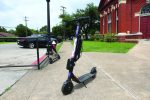Local drivers could feel recall pinch
By LPR Staff
Editor/POST-REGISTER
Millions of drivers, potentially including dozens in Caldwell County, could be affected by the growing recall issued by multiple automakers regarding flawed airbags.
As of Wednesday morning, nationwide news sources were reporting that the recall has increased, and now covers nearly 8 million vehicl
es.
“Responding to these recalls, whether old or new, is essential to personal safety and it will help aid our ongoing investigation into Takata airbags and what appears to be a problem related to extended exposure to consistently high humidity and temperatures. However, we’re leaving no stone unturned in our aggressive pursuit to track down the full geographic scope of this issue,” said NHTSA Deputy Administrator David Friedman on in a statement from the National Highway Traffic Safety Administration on Tuesday.
The affected vehicles were sold regionally in Florida, Puerto Rico, Guam, Saipan, American Samoa, the Virgin Islands and Hawaii. Of particular concern, however, the recalled regions include areas near the Gulf of Mexico, including the Texas Coastal Bend. Both new and used vehicles that originated in those areas, including potentially many in Central Texas, are a matter of concern for drivers.
While the NHTSA offers a website that allows customers to check their vehicle identification (VIN) numbers to see if they will be affected by the recall, that site was plagued with problems on Tuesday and Wednesday, likely spurred by the high traffic on the site. Consumers are urged, instead, to check the website of their vehicle manufacturer to determine whether their vehicle will be affected by the recall.
The NHTSA reported on Wednesday that manufacturers are continuing to update lists as more information becomes available about the wide-sweeping recall, and customers are urged to check back frequently if they have concerns about their vehicles.
The recall originally focused on airbags which, when deployed, may deploy with excessive force and eject shrapnel into the passenger cabin. However, some reports now say that failed sensors could cause airbags to not deploy at all. The Takata airbags have been a cause of concern for some manufacturers for months, with voluntary recalls having been initiated as early as June.
While vehicle manufacturers say there have been no deaths as a result of the airbag problems, a September New York Times report found at least 139 injuries nationwide that could be connected directly to Takata airbag problems.
According to Car and Driver Magazine on Wednesday morning, Takata’s story keeps changing as to where the trouble with the airbags started. Initially, they said, chemicals were improperly stored or mishandled during assembly, allegedly causing excessive pressure that caused the inflators to burst. As the recall has broadened, the company blamed high humidity in regions such as South Florida and the Coastal Bend. Now, according to documents reviewed by Reuters, Car and Driver said, Takata has blamed rust and bad welds for the problems. Additionally, on report said chewing gum had been found inadvertently dropped into an expander.
On Wednesday morning, the NHTSA’s updated list included the following makes, models and years. As answers become more clear, additional vehicle makes and models could be added at any time. The Post-Register will follow this unfolding story, and make additional information available on our website at www.post-register.com
BMW: 627,615 total number of potentially affected vehicles
2000 – 2005 3 Series Sedan
2000 – 2006 3 Series Coupe
2000 – 2005 3 Series Sports Wagon
2000 – 2006 3 Series Convertible
2001 – 2006 M3 Coupe
2001 – 2006 M3 Convertible
Chrysler: 371,309 total
number of potentially affected vehicles
2003 – 2008 Dodge Ram 1500
2005 – 2008 Dodge Ram 2500
2006 – 2008 Dodge Ram 3500
2006 – 2008 Dodge Ram 4500
2008 – Dodge Ram 5500
2005 – 2008 Dodge Durango
2005 – 2008 Dodge Dakota
2005 – 2008 Chrysler 300
2007 – 2008 Chrysler Aspen
Ford: 58,669 total number of potentially affected vehicles
2004 – Ranger
2005 – 2006 GT
2005 – 2007 Mustang
General Motors: undetermined total number of potentially affected vehicles
2003 – 2005 Pontiac Vibe
2005 – Saab 9-2X
Honda: 5,051,364 total number of potentially affected vehicles
2001 – 2007 Honda Accord
2001 – 2002 Honda Accord
2001 – 2005 Honda Civic
2002 – 2006 Honda CR-V
2003 – 2011 Honda Element
2002 – 2004 Honda Odyssey
2003 – 2007 Honda Pilot
2006 – Honda Ridgeline
2003 – 2006 Acura MDX
2002 – 2003 Acura TL/CL
2005 – Acura RL
Nissan: 694,626 total number of potentially affected vehicles
2001 – 2003 Nissan Maxima
2001 – 2003 Nissan Pathfinder
2002 – 2003 Nissan Sentra
2001 – 2003 Infiniti I30/I35
2002 – 2003 Infiniti QX4
2003 – Infiniti FX
Mazda: 64,872 total number of potentially affected vehicles
2003 – 2007 Mazda6
2006 – 2007 MazdaSpeed6
2004 – 2008 Mazda RX-8
2004 – 2005 MPV
2004 – B-Series Truck
Mitsubishi: 11,985 total number of potentially affected vehicles
2004 – 2005 Lancer
2006 – 2007 Raider
Nissan: 694,626 total number of potentially affected vehicles
2001 – 2003 Nissan Maxima
2001 – 2004 Nissan Pathfinder
2002 – 2004 Nissan Sentra
2001 – 2004 Infiniti I30/I35
2002 – 2003 Infiniti QX4
2003 – 2005 Infiniti FX35/FX45
Subaru: 17,516 total number of potentially affected vehicles
2003 – 2005 Baja
2003 – 2005 Legacy
2003 – 2005 Outback
2004 – 2005 Impreza
Toyota: 877,000 total number of potentially affected vehicles
2002 – 2005 Lexus SC
2002 – 2005 Toyota Corolla
2003 – 2005 Toyota Corolla Matrix
2002 – 2005 Toyota Sequoia
2003 – 2005 Toyota Tundra



